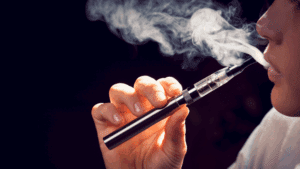When preparing for plastic surgery, patients often expect to hear about things like fasting before anesthesia or stopping certain medications—but one thing that surprises many people is that we test for nicotine before surgery.
I completely understand how this might feel a little invasive or even frustrating, especially if you’re doing everything you can to be ready for your procedure. But I want to explain why we take this so seriously and what it means for your safety and your final result.
Why Nicotine and Surgery Don’t Mix
Nicotine, no matter how it’s delivered, has powerful effects on your body—especially when it comes to healing. It causes blood vessels to constrict, reducing blood flow to the skin and deeper tissues. That means less oxygen and fewer nutrients reach your healing incision sites.
This puts you at much higher risk for delayed wound healing, poor scarring, skin loss, and even infections. In facial plastic surgery, where blood supply and tissue handling are critical, the stakes are even higher. I’ve seen patients in consultation who had procedures done elsewhere without quitting nicotine, and the long-term damage to the tissue can be devastating.
What Counts as Nicotine?
A lot of patients ask, “Does that just mean cigarettes?” The answer is no—any form of nicotine can affect healing. That includes:
Cigarettes
Vapes and e-cigarettes
Nicotine gum and lozenges
Nicotine patches
Hookah or cigars
Smokeless tobacco (like dip or snuf)
Even if you’re using these products to try to quit smoking, if they contain nicotine, they can still compromise your healing.
A Look at Nicotine Use Trends in the U.S.
In recent years, the conversation around nicotine has shifted. Traditional cigarette smoking has declined, especially in younger populations, but vaping and e-cigarette use has surged. Many people believe these alternatives are safer or don’t “count,” but the nicotine levels in some vape products can actually be higher than in traditional cigarettes.
Unfortunately, the rise in vaping means more patients may be unknowingly putting their healing at risk, thinking they’ve made a “healthier” switch. It’s important to understand that nicotine is the problem, no matter the source.

Our Process Before Surgery
Because I take your safety and your results so seriously, we test all of our surgical patients for nicotine at your preoperative appointment. This is a simple urine test using a dipstick that gives us results right away.
If your test is positive, we will likely reschedule your surgery for a later date to give your body time to clear the nicotine out of your system. For people who test positive but are determined to quit, we’ll work with you and give you guidance on how long to wait before retesting.
If we know you’ve been actively using nicotine or recently tested positive, we’ll also perform a second test on the day of surgery to ensure that your system is truly clear. That might seem strict, but I promise—it’s only because we want you to have the best possible chance at healing well and loving your final result.
Your Safety Comes First
Surgery is a partnership. You trust me to use every bit of my skill and experience to help you get the results you want—and I need to be able to trust that your body is ready to heal. Avoiding nicotine is a big part of that.
The nicotine test before surgery isn’t about judgment. It’s about protecting your investment, your health, and your outcome. If you’re thinking about surgery or already have one scheduled, now is the time to quit—and we’re here to support you every step of the way.
If you have questions about the nicotine test or how to safely stop nicotine before surgery, don’t hesitate to reach out to our office. We’re here to help you succeed.
Other Helpful Resources: